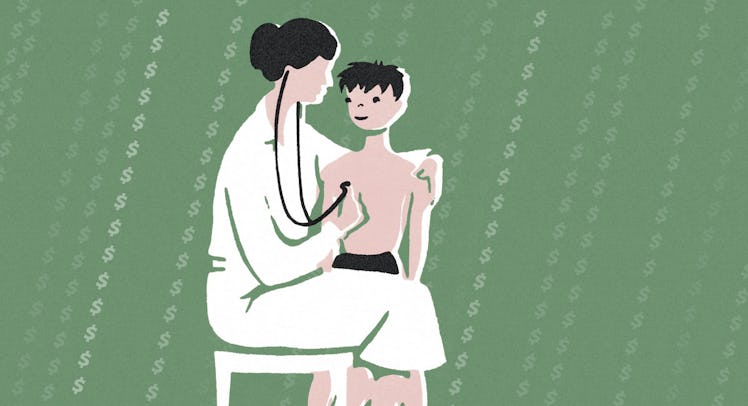CHIP Funding Deal Means Americans Pay More to Help Kids Less
Thank goodness CHIP is finally funded. But, wait, this deal is awful.

Three days into the government shutdown, Democrats and Republicans on Capitol Hill came to a funding agreement that will keep agencies open through February 8. The agreement did not include the DACA protections sought by Senate Democrats, but did include funding for the Children’s Health Insurance Program. After 100-plus days of debate, one of the most popular federal programs — previously supported predictably by both parties — was refunded for the next six years for $800 million dollars.
CHIP, which provides health care cover to nearly nine million children and 375,000 pregnant women, expired in late September of of last year. Since that time, states had used emergency funds in order to keep it program afloat. Some states were forced to cut back on tertiary services in order to do so. In some states, the program was days away from shutting down. In others, it already had. News of the funding measure passing in Washington was welcome to many, but astute observers might see the cloud inside the silver lining.
Six years of funding is not very much.
Politically speaking, this year has been characterized by political polarization and in-fighting. Whether or not the Trump administration has exacerbated tensions between Democrats and Republicans or merely altered the light in which that conflict is seen, it’s plain that politics as usual has become politics as permanent war. That means, unfortunately, that Americans can now look forward to a fight over CHIP, which, again, is an incredibly popular program, in six year’s time. Looking at the numbers it becomes clear that this is not just less than ideal. It’s bizarre.
What makes the decision to only reauthorize the program for six years confounding is what we know about program costs courtesy of the Congressional Budget Office. Slate got their hands on an intergovernmental memo from the CBO and that memo stated that the longer that CHIP is re-authorized for, the more money the government will save. The CBO estimated that if CHIP were extended for a decade, rather than just five years, the re-authorization would save the government six billion dollars.
You read that right. Given the opportunity to save money by providing better healthcare to children for longer, Democrats and Republicans came together and decided that, nah, they would fund CHIP for six years.
Incidentally, the reason why CHIP saves the government money if its funded for a longer period of time is pretty easy to grasp: If more kids are kicked off of the program, they’re likely to enroll in public-private Affordable Care Act insurance, which the federal government subsidizes. And according to Slate, a longer re-authorization would mean that in the second half of the re-authorization period, the program would be far more generously funded, meaning that more families would drop their Affordable Care Act insurance for their kids and exchange it for CHIP.
Of course, in the grander scheme of federal funding, $6 billion (less than that, actually, if you walk it out) is not a ton of money, but the funding plan is still indicative of broken politics. And the bottom line is this: Broken politics threaten the long-term health of CHIP as well as any other government program that demonstrably helps children. The ultimate agreement seems to represent evidence that partisans are looking for another federal program to bludgeon themselves with. CHIP is, it bears repeating ad nauseum, a terrible choice. CHIP helps sick kids. It’s cost effective (especially if politicians don’t make stupid decisions). It works.
Is it good that CHIP is finally funded? Absolutely. Unequivocally. But let’s not have a party just yet.
This article was originally published on